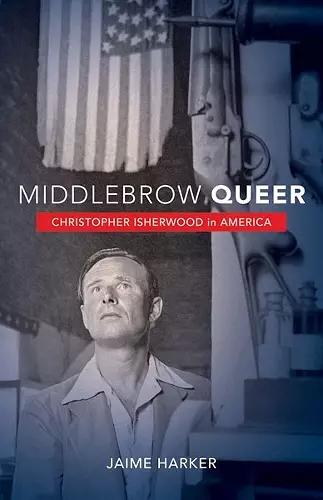Middlebrow Queer
Christopher Isherwood in America
Format:Hardback
Publisher:University of Minnesota Press
Published:22nd Feb '13
Currently unavailable, and unfortunately no date known when it will be back
This hardback is available in another edition too:
- Paperback£19.99(9780816679140)

How could one write about gay life for the mainstream public in Cold War America? Many midcentury gay American writers, hampered by external and internal censors, never managed to do it. But Christopher Isherwood did, and what makes his accomplishment more remarkable is that while he was negotiating his identity as a gay writer, he was reinventing himself as an American one. Jaime Harker shows that Isherwood refashioned himself as an American writer following his emigration from England by immersing himself in the gay reading, writing, and publishing communities in Cold War America.
Drawing extensively on Isherwood’s archives, including manuscript drafts and unpublished correspondence with readers, publishers, and other writers, Middlebrow Queer demonstrates how Isherwood mainstreamed gay content for heterosexual readers in his postwar novels while also covertly writing for gay audiences and encouraging a symbiotic relationship between writer and reader. The result—in such novels as The World in the Evening, Down There on a Visit, A Single Man, and A Meeting by the River—was a complex, layered form of writing that Harker calls “middlebrow camp,” a mode that extended the boundaries of both gay and middlebrow fiction.
Weaving together biography, history, and literary criticism, Middlebrow Queer traces the continuous evolution of Isherwood’s simultaneously queer and American postwar authorial identity. In doing so, the book illuminates many aspects of Cold War America’s gay print cultures, from gay protest novels to “out” pulp fiction.
"Jaime Harker’s approach to Isherwood’s American work—his Cold War novels, as she calls them—is a welcome fresh perspective on a neglected topic. In situating Isherwood’s ‘50s and ‘60s writing in the context of the rise of the paperback book, its distribution system, and readership, Harker recuperates a period of active gay and lesbian publishing. The history she uncovers of queer publishing in the Cold War years complicates the common history of homophobia and persecution associated with the era." —James J. Berg, editor of Isherwood on Writing
ISBN: 9780816679133
Dimensions: 216mm x 140mm x 25mm
Weight: unknown
216 pages